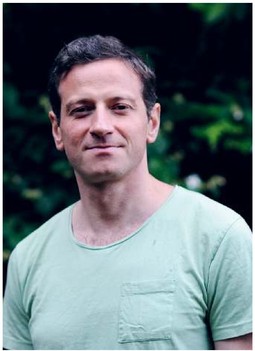The Evolution Of Intimacy
In a world where technology dominates the dating scene, are we moving further and further away from being able to create and sustain intimate connections? Giovanni Frazzetto, author of Together Closer, a book that blends iction with psychology and neuroscience to explore modern issues of intimacy, talks to Brian Finnegan about the app gap.

Photos by Giovanni Dall’Orto
“ Our screens are a form of safety. Sitting in our living rooms, we don’t need to go anywhere, and we will get this dialogue with someone.
In the decade since the first iPhone was released, the face of dating has changed, and in particular for gay men, since the appearance of Grindr in 2009. Myriad ‘hook-up’ apps have replaced bars and clubs as the primary place in which gay guys meet, allowing us to cruise from the comfort of our own sofas. But, while they provide convenience, they have also had an uncharted effect on the evolution of intimacy, putting new obstacles in the way of connecting while at the same time connecting people in new ways.
Some of the challenges presented by the evolution of the app dating culture are described by Sicilian scientist and author, Giovanni Frazzetto, whose new book, Together Closer mixes fiction with scientific fact in a series of stories that explore the nature of intimacy in modern times. Originally a molecular biologist, Frazzetto has blended his research into neuroscience and psychology with his creative side to write short stories that each home in on an aspect of intimacy, whether it be in friendship, family or love relationships. A gay man himself, he’s used some of the stories to explore issues that affect gay men when it comes to desire and intimacy.

Giovanni Frazzetto, author of Together Closer Photo by Dominique Caillat
“ You fall in love with someone and that’s scary because that person can shed light on parts of yourself that you’re not so comfortable with.
“There’s so much choice,” he says of the technological dating pool. “That’s fine but the research says the more we dilute our choice, the less we get what we actually want. If that gets out of focus, we won’t look for it anymore. Do I prefer this to that? Why am I interested in this person, what is so special about them? If you confound with so many other options, the value will be lost, as with economics.
“We should remind ourselves of that.”
Frazzetto believes this inflation of choice, and the lack of commitment it fosters, feeds into a problem many gay men have with intimacy, which is rooted in “an accumulation of things; society pressure, sometimes family pressure.”
“It’s unfortunate that many gay men should feel unworthy of loving and being loved,” he says. “There’s a sort of reaction to it, or a self-protection from that pain that reflects into behaviour. We know we need intimacy, but we are also afraid of it or think that we shouldn’t have it, so what we do is erect walls and barriers against it that come in different forms.
“Our screens are a form of safety. Sitting in our living rooms, we don’t need to go anywhere to start a dialogue with someone. If people want to have relationships, I think it’s important that they not just have fantasies about it, or say that you want a relationship but then in fact shield yourself behind a screen.”
THE NEW CONSUMERISM
While the apps provide a kind of safety barrier, they are also a kind of convenience shopping experience that recasts dating as consumerism in which we commodify ourselves.
“Desire is difficult to understand, and it’s part of who we are,” Frazzetto says. “We make ourselves vulnerable by facing our desire, so we tend to avoid it and technologies of this kind can help this avoidance. Because in fact, you’re not dealing with your desire if you’re sitting on your sofa looking at a screen. Desire plays out in the real world, with another person.”
One story in the book, ‘A Winter Garden’ is about a character called Paul, who is using the dating apps after the breakdown of a three-year relationship.
“There are people who only want to have sex with Paul, and there are people who chat with him incessantly; they go all kinds of places with their imaginations, but when it comes to meeting up they make all sorts of excuses. There are people who meet with him and have sex with him, but then they either ghost him or come up with other excuses, telling him he’s special and he’s unique, so they’re flattering him at the same time as rejecting him. They’re rejecting him because he’s real. He represents the challenge for intimacy.
“Intimacy is not just a physical act, and it doesn’t just involve other people. You need to know that you mean something for someone, but intimacy means also looking at yourself in the mirror. Intimacy is a mirror, and somebody else can help you look in the mirror without looking away. You fall in love with someone and that’s scary because that person can shed light on parts of yourself that you’re not so comfortable with. But that can be one of the most rewarding things.”
NO MORE BULLSHIT
Problems with desire and intimacy have been around since the dawn of time, and in particular for gay people who have had their desires shamed and disavowed. But one story in Together Closer suggests that ironically, as the western world has liberalised around homosexuality, intimacy has become more difficult for gay people. In ‘Yes’ a woman, Margo, looks back to the 1970s and ‘80s, and her deep friendship with a gay man called Maurice, who eventually died from AIDS.
“Before he dies, they pledge to be truthful,” says Frazzetto. “They say, ‘no more bullshit, we want to be open to love’. This is fiction, but I’ve gathered from conversations I’ve had with people who lived then that perhaps because things have become so liberal, and we have such enormous choice now, that it dilutes the preciousness of what it meant to be in a same-sex relationship. If they found somebody, they clung to it.”
The story goes back to the past, but it’s a message for the future, telling everyone to come on and say yes to intimacy, and just mean it. The man at the heart of it didn’t live long enough to see his dream realised. So, it’s a message about valuing what life holds, the intimacy that life holds.”
In ‘Yes’, Margo and Maurice erect a plaque on the inside of their apartment door, reading NMBS. “It stands for ‘no more bullshit’ says Frazzetto. “It’s about truth and respect. Respecting yourself by being truthful, both with yourself and others. Maybe it’s easier said than done, but we could all adopt this perspective, because the fact that we avoid desire and intimacy is propagated, so it takes away the joy from a real relationship. If we all try to behave differently we can make a contribution to the evolution of intimacy, we could all learn from each other.
“It would be so lovely if the readers who approach this book and see the stories and they learn about the characters and are given some inspiration to find ways to live their lives as their true selves, if they can find a way to be more like Maurice, with ‘No More Bullshit’.”
‘Together, Closer: Stories of Intimacy in Friendship, Love and Family’ by Giovanni Frazzetto is published by Piatkus